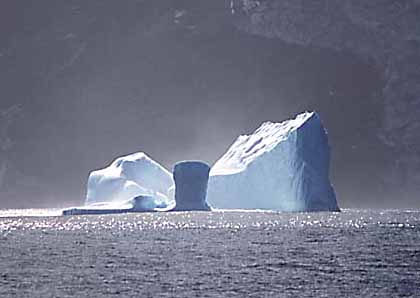American researchers have discovered that the Arctic Circle may contain as much as 30% of the world's undiscovered natural gas deposits and upto 13% of undiscovered oil, or double what we first thought. Writing in the journal Science, US Geological Survey (USGS) scientist Donald Gautier and his colleagues have used geological data, including information provided by petroleum companies, to make predictions about the locations and quantities of oil and gas reserves north of the Arctic Circle.
 They began by first geologically dividing up the area, which covers 6% of the planet's surface, and singling out 49 hotspot regions termed assessment units (AUs). These were areas that contained the appropriate types of sedimentary rocks more than 3km thick, the minimum rock depth thought to be required to bury petroleum-bearing source rocks sufficiently to produce oil. Onto this map the team then superimposed data about the source rock types, migration pathways and other geological configurations that alter the prospects of finding oil in a given location. They then compared these findings with similar results compiled from 246 other oil-bearing locations worldwide in order to make predictions about the chances of each of the Arctic areas containing appreciable reserves.
They began by first geologically dividing up the area, which covers 6% of the planet's surface, and singling out 49 hotspot regions termed assessment units (AUs). These were areas that contained the appropriate types of sedimentary rocks more than 3km thick, the minimum rock depth thought to be required to bury petroleum-bearing source rocks sufficiently to produce oil. Onto this map the team then superimposed data about the source rock types, migration pathways and other geological configurations that alter the prospects of finding oil in a given location. They then compared these findings with similar results compiled from 246 other oil-bearing locations worldwide in order to make predictions about the chances of each of the Arctic areas containing appreciable reserves.
The results suggest that between 22 billion and 256 billion barrels of oil lie undiscovered underneath the Arctic, which is more than double what's previously been discovered there and might account for up to 4% of the world's remaining oil and 13% of the remaining undiscovered oil. To put these numbers into perspective, current estimates suggest that the World burns 30 billion barrels of oil per year and there are about 1240 billion barrels remaining globally. At worst, the Arctic could probably sate the populations thirst for oil for at least one year.
As well as oil the models also predict prodigious natural gas deposits at least three times greater in energy terms than the oil reserves. Most of this gas is in Russian territory which, say the researchers, could "reinforce the preeminent strategic resource position of that country," if they exploit it. Either way, tough decisions need to be taken regarding the recovery of Arctic oil given the environmental costs, both of obtaining it and when it is burned.









Comments
Add a comment